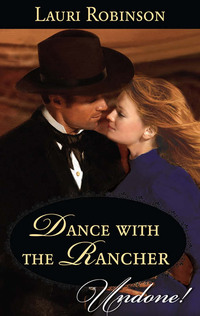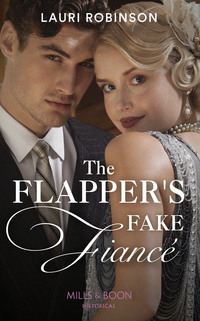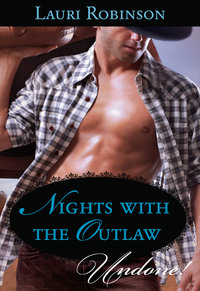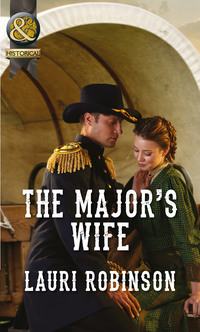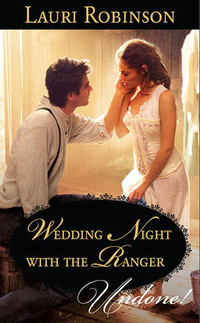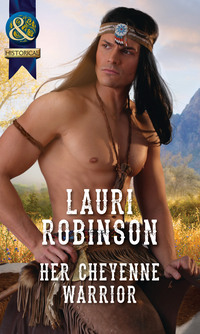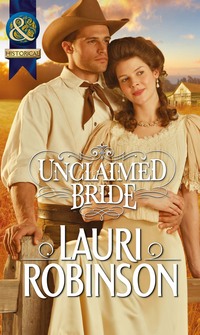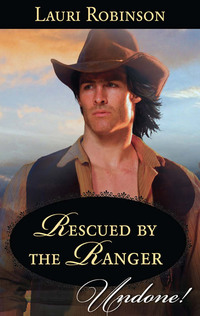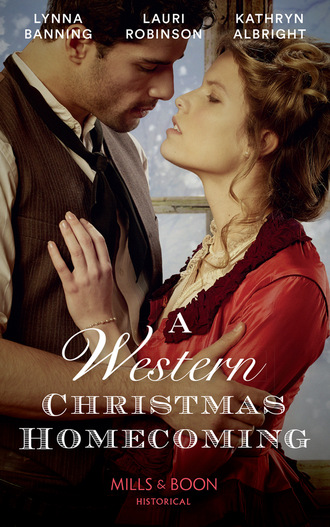
Полная версия
A Western Christmas Homecoming
“Maybe because I just realized how alone we are way out here in the middle of nowhere. No lights. No sheriff. No...help.”
“Alone is good. A smart traveler is always wary of company on the trail. Besides, I’m a marshal, remember?”
His voice sounded overpatient. Surely she wasn’t being a trial. For the last twenty-four hours she had worked hard to appear calm and rational and brave. She couldn’t lose control now. She just couldn’t.
“Alice? Is something wrong?”
“No. Well, yes. I am—I am a bit frightened.” A little laugh escaped her. “Actually, I am a lot frightened!”
“That’s a relief,” he said. “I was beginning to think you were more stone statue than flesh-and-blood girl.”
“Oh.” His voice was not accusing; it was understanding, which was a relief. “I assure you, Marshal, I am quite human.”
Rand turned toward her. “For God’s sake, Alice, could you call me Rand instead of ‘Marshal’?”
She flinched, and Rand was instantly sorry he’d snapped at her.
“Of course,” she said quietly.
He strode off to the stream, and when he returned she was rolled up in her blankets like a sausage, her body curled close to the dying fire. He stood looking down at her for a long time, thinking how the firelight made everything look soft until it faded into blackness. And then he noticed the blanket was shaking.
She was crying. He couldn’t hear her, but he knew. He dragged his own bedroll from behind the saddle, shucked his boots and stuffed his Colt under the saddle at his head. Then he crawled next to her, wrapped himself in his bedroll and pulled the shuddering bundle into his arms.
“Alice, I’m sorry. Guess I’m tired, but I didn’t mean to snap at you.”
The blanket covered her face, but he could hear her still crying. Of all the things that he hated in life, hearing a woman cry was the worst.
“Alice.”
“I—I’m not crying because of anything you s-said, Mar—Rand. I’m crying b-because I’m exhausted and saddle-sore and s-scared.”
Relief surged through him. “Alice, if you weren’t scared, you’d be crazy.”
She gave a choked laugh. “Well, then, it would appear I am most certainly not crazy.”
“I’ve been scared plenty of times, Alice. Once on an army patrol we ran into a bunch of outlaws holed up in a canyon. It was my first campaign, and I was plenty scared. We managed to capture all but two of them, and I was scared the whole time.”
“What happened to the two you didn’t capture?”
He hesitated. “I shot them.”
“Were you frightened then?”
“The fear was there all the time. I just tried to move through it and keep going.”
She nodded and he heard a ragged sigh. “Thank you, Rand.”
He lay for a long time with his arms around her blanket-wrapped form. Finally her breathing evened out and he figured she’d fallen asleep. Just as he started to ease his arm out from under her, the blanket fell away and she opened her eyes and tried to smile.
“I have had a really terrible time since you told me about my sister. Most of the time I feel like screaming.”
“You want to give it up? Go back to Smoke River?”
There was a long silence. “No,” she said at last. “I want to keep on. I want to find whoever killed my sister.”

They rode east, toward Idaho Territory, and the landscape turned brown and dry and hot. Tiny stinging insects swarmed around Alice’s face, and no matter how much she swatted and flailed at them, they got caught in her hair. The streams grew narrower, and the shallow rivers they rode across flowed green and lazy. She desperately wanted a bath.
To occupy her mind, she studied Rand Logan. He was interesting in a lawman sort of way, with his rifle nestled in a saddle scabbard and a worn leather gun belt strapped low on his hip. His leather boots had spurs, which chinged when he walked, but she never saw him touch his horse with the rowels. Maybe the spurs were just for show.
Except that Marshal Logan didn’t seem to care about appearances. This morning he’d shaved hastily and sloppily, and the dark mustache over his upper lip looked a little raggedy. She liked his eyes, green as jade and always watchful. He certainly didn’t talk much, but when he did speak she paid attention. She had to pay attention, she acknowledged. This was the most frightening thing she had ever done.
As a librarian she’d led a very circumspect life. No bumps or surprises, just nice, quiet books in a nice, quiet building in a nice, quiet town. Books were her life, her reason for living. The printed word made sense of the world around her, of things she couldn’t control, like wars and floods and hunger and suffering.
And murder. She knew the only way she could help find Dottie’s murderer was to follow this man into God knows what, and that made her more than a little bit uneasy.
Halfway through the afternoon they turned north, toward the mountains. Now, instead of riding straight into the sun, its rays came from her right, and she quickly learned to keep her hat tilted and the shirtsleeve on that side rolled down to avoid sunburn.
But by midafternoon, the hot October sun was burning her skin right through the fabric.
Rand rode with his gray Stetson tipped down so far she wondered how he could see the trail ahead. Occasionally she glanced over at him, but he didn’t notice. Or didn’t seem to notice. He studied the trail ahead, his right hand always resting on the butt of his revolver. Force of habit, she guessed.
Hour after uneventful hour passed, but he still watched everything, even her. And she couldn’t help studying him when he wasn’t looking. His hair was overlong, just brushing his earlobes. And the hand holding his reins was lean and long-fingered. A surgeon’s hands. Why had he chosen to become a US Marshal rather than a doctor?
She flicked the chestnut’s reins and drew ahead of him, then waited for him to catch up.
“In a hurry?” he called.
“I get restless just plodding along with nothing to do but think.”
“If you want your horse to last in this heat, you’ll go slow.”
“Slow is hot,” she said.
“I figure there’s a stream a couple of miles ahead. We can stop there.”
“How could you possibly know that?”
“Trees.” He tipped his head. “Look yonder. Cottonwoods grow where it’s wet. Willows, too.”
Sure enough, a fuzz of green leafy growth appeared on the horizon. She couldn’t wait for the stream; just thinking about water made her thirsty. She uncapped the canteen hanging on her cantle and shook it. Empty. Rand unhooked his own canteen and passed it to her.
“Why am I out of water when you’re not?” she wondered aloud.
“Maybe because you’re greedy?” He phrased it as a question, but she got the message. She shouldn’t guzzle water just because she was thirsty; she should ration it out. She took a single swallow of the warm, metal-flavored water and handed the canteen back to him.
She was completely out of her element out here. This wilderness was so far removed from her peaceful, quiet library she might as well be on the moon.
Another hour brought them to a little trickle of a stream, just enough to water the horses and refill the canteens. There was barely enough to splash over her sweaty face and neck.
“Still got a couple hours of daylight left, Alice. Are you okay with going on?”
She laughed. “You mean I could hurry up the sunset if I wanted to stop for the night? Librarians are smart, but they’re not that smart.”
He turned his head to grin at her and she noticed something. One side of his face was darker than the other. He must have been riding north before he arrived in Smoke River and his sunburn had turned his skin tan.
“Rand, where were you coming from when you reached Smoke River?”
“How do you know I didn’t come in on the train?”
“I just know. Librarians are—”
“Observant,” he finished with a chuckle. “I was coming from Colorado Territory. Denver City.”
“Colorado! That’s hundreds of miles from Oregon.”
“Sure is. Why do you think I was so hungry at supper that first night?”
“Why didn’t you take the train from Denver City instead of riding all that way?”
He didn’t answer for a long while. “Because I needed the time,” he said finally.
“Time for what?”
“Time to work out a plan. And,” he added, “I didn’t want to load Sinbad on a freight car.” He bent to pat his horse’s neck.
For the next hour Alice thought about his answer. So he needed to think up a plan. And he cared about his horse. Interesting.
By the time they made camp next to a pretty, shaded river in the foothills, she had run out of questions. She watched him loosen the cinch and rub his bay down with a handful of dry grass, then do the same for her chestnut mare. Finally he dropped both saddles at her feet and strode off to the river. When he returned, his hair was dripping wet.
“I’ll put some supper together while you take a bath if you want. There’s a little pool behind that scrubby willow, and I didn’t leave any soapsuds floating in the water.”
Soapsuds! She didn’t have any soap that would make suds. She had forgotten to purchase soap at the mercantile, so she had only a sliver of Sarah’s yellow laundry soap.
“Think you’re gonna be scared tonight?” he asked.
“What an odd question. I expect I will be scared every night until...until this is over. Why do you ask?”
“Just wanted to know how close to lay our bedrolls.”
She eyed the two saddles he’d dropped at her feet. “Close,” she said. “You are the experienced one with a gun.”
As it turned out, Rand regretted sleeping close to her. All day he had been reviewing his plan for catching her sister’s killer, deciding who to interview and what premises to inspect. He was also worrying about how to keep Alice safe in an untamed mining camp.
He was continually surprised by the woman riding with him. She wasn’t frightened by the things that should frighten her, like trapping a killer. Instead she jumped at rustling in the underbrush, at buzzard calls, at things that were no threat, like a chicken hawk swooping off a tree limb or a rabbit scuttling away under a huckleberry bush.
But she had no idea how rough the frontier outside a small peaceful town like Smoke River could be. And she had a lot to learn about open country. He knew he could keep her safe in countryside like this, where there was clearly identifiable danger. But what about in a rough mining town?
He’d noted that Alice could be a bit headstrong, somewhat impulsive in making decisions and stubborn when it came to defending them. He figured Rooney hadn’t had a prayer in hell of dissuading her from accompanying him. But Alice knew nothing outside of her genteel, civilized life as a librarian. He was apprehensive about her getting hurt.
They spent an uneventful night rolled up in their blankets beside the campfire, and while Alice said she wasn’t frightened, Rand still worried.
The next morning his worst fear played out. After a breakfast of coffee and biscuits he had mixed up and baked on a hot rock, he packed up the saddlebags and they started into the hills. They followed a barely discernible trail that wound up through dry scrub and stands of sugar pine and alder trees, and they had just come around a bend when they ran smack into a surprise.
A seedy-looking character in frayed Levi’s and a rumpled shirt was perched on a flat rock with a rifle trained on them.
Rand drew rein.
The man’s bloodshot eyes studied his horse for a long minute. “Where ya goin’, mister? And missus,” he added.
Rand prayed to God Alice would keep her mouth shut. Casually he crossed his hands over the saddle horn and bent toward the man. “Goin’ to Boise City, friend. I own the saloon next to the hotel.”
Behind him he heard Alice give a little squeak.
“Ya do, huh? How come I never seen you there?”
“Guess that’s because I’ve been traveling for the last month.”
“Oh, yeah? Where to?”
“Eastern Idaho. Little town called Broken Toe.”
“Broken Toe, huh? Never heard of it.”
“I’m not surprised,” Rand said easily. “Hardly more’n a wide spot in the trail.”
The man eased his bulk off the rock and clumped down close enough to poke his rifle barrel into Sinbad’s neck. “Whatcha doin’ in Broken Toe?”
“Gettin’ married,” Rand said quickly.
Alice gave another squeak.
“Yeah?” The bloodshot eyes lifted to Alice. “She yer wife, is she?”
“Yep. Name’s Oliver,” Rand volunteered. “George Winston Oliver. My wife’s called Bess.”
“Well, now, Bess. Whaddya got to say fer herself?”
“I say that I am eager to see the new house George has purchased in Boise City,” Alice said smoothly.
The man gave her a lingering look. “Say, you’re a right pretty gal!”
Rand held his breath.
Alice cleared her throat. “I was voted the belle of Broken Toe when I was a girl,” she said.
“Were ya, now?” The man took two unsteady steps forward. “Ya still don’t look more’n a girl, honey.”
Rand spotted a saddled horse almost hidden among the trees. Unobtrusively he moved his hand toward his holstered Colt.
“George,” Alice called. She moved her horse forward and reined to a stop on Rand’s right, shielding his gun hand from view. “You said your father is expecting us, and he never likes anyone to be late. And you told me how impatient he is, being the sheriff.”
“Huh?” Scruffy sent her a sharp look. “What’s in them saddlebags, Miz Oliver?”
“Pots,” Alice said instantly. “And my mama’s best iron skillet. She gave it to us for a wedding present.”
“Got any money?” He took a step closer and Rand thumbed off the safety on his revolver.
Alice’s laughter rang out. “Money! You can’t be serious. Ever since we left Broken Toe, George has been complaining about how much our wedding cost him. And now...” She reached over and playfully slapped his arm. “We have nothing left to set up housekeeping with except my mama’s iron frying pan and some old pots.”
“Got any liquor?”
Alice drew herself up so stiff Rand thought she might pop the buttons off her red plaid shirt. “Sir! I am a good Christian, raised in St. Joseph’s United Methodist Church in Broken Toe. I will have you know I never, ever touch spirits! And,” she added with a sidelong look at Rand, “now that we’re married, George doesn’t touch spirits, either.”
Rand unclenched his jaw and choked back a snort of laughter. Alice was as inventive as she was pretty.
The man groaned and began to back away. “Oh, hell, I’m wastin’ my time on you two.” He staggered off into the trees for his horse, and clumsily pulled his bulk into the saddle.
“Adios!” he called. Rand watched the man wheel his mount, crash through the brush and disappear. He waited until the hoofbeats faded away, then thumbed the safety back on.
“Is—is he gone?” Alice whispered. He noticed the hand holding her reins was shaking.
“Yeah. Pretty quick thinking, Miz Oliver. Very creative.”
She gave a nervous laugh. “Really? I was petrified!”
He chuckled. “You been reading books on acting in your library?”
She was silent. He stepped Sinbad forward. “Come on, Miz Oliver. We’ve got hours of riding ahead of us.”
Chapter Six
By the time Rand indicated where they would camp for the night and drew rein, Alice had managed to stop shaking.
“You okay?” he asked.
She nodded.
He sent her a curious but admiring look. “Whatever were you thinking to spin such an outlandish tale?”
“You started it,” she pointed out. “You invented George...what was his name? Oliver? And the town of Broken Toe. Where did that come from?”
“I sure as heck don’t know,” he confessed. He couldn’t seem to stop looking at her. “But you came up with the part about the wife and the expensive wedding and the frying pan.”
“Maybe you have been reading books on acting,” she quipped. She lifted her bedroll out of the saddlebag and tossed it near the circle of stones Rand was gathering to make a fire pit.
“We have to decide some things about Silver City,” he said. He pared dry twig shavings with his pocketknife and arranged leaves and small branches over them. “I don’t want to make up our story on the fly.”
“Very well. I am a saloon girl and you are...?”
“Your bodyguard. George Winston Oliver. Pick a name for yourself, Alice.”
“Martha.”
“Nah, too grandmotherly.”
“Suzannah, then.”
“Too Southern. You don’t sound Southern. You sound Northern. Yankee-refined.”
“What about—?”
“Lolly,” he supplied. “Lolly...Maguire. If you’re Irish you’ll be forgiven for a bit of blarney if you make a mistake.”
“Lolly,” she murmured. “Rand, I have never set foot in a saloon. What does a saloon girl do, exactly?”
He tramped twice around the fire pit, stopping to extract a tin of corn and another of beans from his saddlebag. Using his jackknife, he jimmied the beans open and set the can on a flat rock near the fire. Then he sat back on his heels and looked up at her to answer the question.
“A saloon girl dances with the patrons. Gets them to buy her drinks. Flirts. Maybe she sings a bit.”
“Sings? Sings what? The only songs I know are hymns.”
He laughed. “Then it looks like I’m gonna have to teach you some bawdy songs.”
That piqued her interest. “What would be the lyrics to a bawdy song?”
Alice Montgomery, you should be ashamed of your interest in such things.
But she wasn’t ashamed. She was curious. In fact, she felt a bit daring, venturing to delve into the mysteries of the seamy side of life like the girls down at Sally’s, the ones Verena Forester sewed fancy dresses for.
“Are you going to share a bawdy song with me?” she asked.
Rand busied himself spooning corn and beans into a blackened kettle and set it near the fire. “A bawdy song,” he murmured. “Let me think.” After a long pause, he turned toward her.
“Here’s one. ‘A pretty girl from Abilene, tall with hair of red, she waltzed a gent and talked so sweet, he forgot his wife, took her to—’”
He broke off. “Well, you can guess the rest.”
Alice’s cheeks felt hot. Songs with words like those certainly did not appear in library books!
She stared at him. “Where on earth did you learn a song like that?”
“In a saloon,” he said drily. He busied himself stirring the corn and bean mixture in the pot, then dumped a handful of coffee beans in the small wooden mill and rattled the handle around and around. Alice thought his cheeks looked a bit pink, but it was getting dark so she couldn’t be sure.
She did wonder about him, though.
“Have you spent a lot of time in saloons?” she asked.
“Nope.” He set the coffeepot over the fire and spooned some of the corn and bean mixture onto a tin plate and handed it to her.
“You mean you just made up that song?”
“Sure. Kinda like you coming up with that wild tale about your mama’s frying pan and the Boise City sheriff.”
“And tomorrow I will have to pretend to be Lolly Maguire, a saloon girl.”
“Yeah,” Rand said. He shot her a glance. “Think you can manage it?”
Oh, my, Alice thought. What would someone called Lolly Maguire say to a man? Especially one in a saloon?
“I will try,” she said. “I might turn out to be such a convincing Lolly Maguire you may be quite smitten!”
Instantly she dropped the spoon onto her tin plate with a clank.
Where had that thought come from?
Rand gave her a long look and without a word poured a mug of coffee and set it on the ground near her elbow.
“Smitten, huh? Alice,” he said with a chuckle, “it’s the miners you’re supposed to charm, not me.”
Chapter Seven
When they reached Silver City they reined up on the hill overlooking the canvas structures and flimsy-looking buildings of the town spread below them. “It’s a mining camp, like I told you,” Rand said. “Looks kinda impermanent.”
“It looks like a sea of gray canvas.” Alice pointed to a large green-gray canvas structure with a white-painted wooden cross over the entrance. “Even the church is a tent!”
Rand turned to her. “Are you ready for this?”
“Yes, I am ready.” Her heart thumped under her plaid shirt as she followed Rand’s bay, guiding her mare down to Silver City. The narrow road into what passed for a town was oozy with thick mud that squished under their horses’ hooves.
They picked their way down the tent-clogged street until they reached the two-story red-painted Excelsior Hotel, which, thank God, was made of wood. But red? Such a bold color for a hotel!
Next door to the hotel was another wooden building, the Golden Nugget saloon. That seemed strange in a town named for its silver mine. There must be other wooden buildings, but all she could see were tents and more tents. Big ones. Little ones. Some more ragged than others.
Oh, poor Dottie. Could her sister really have been happy here in this temporary-looking place?
The desk clerk at the hotel, a bent gray-haired man with thick spectacles and a wrinkled shirt that had once been white, flipped open the register and stood poised with his pen.
“Name?” he said in a weary voice.
“George Oliver.”
“This your wife, Mr. Oliver?”
Rand turned to her. “This is Miss Lolly Maguire.”
“Separate rooms, then,” the clerk muttered.
Rand laid his hand across the register. “One room. Miss Maguire is a well-known entertainer, and I work as her bodyguard. Where she goes, I go.”
The clerk’s salt-and-pepper eyebrows waggled. “Even to her hotel room?”
“Our hotel room,” Rand said evenly. “Like I said, Miss Maguire doesn’t go anywhere without her bodyguard. Where she goes—”
“I go,” the clerk finished. “Oh, well.” He sighed. “It’s not the first time two crazy people came through town.”
“We’re not going ‘through’ town. Miss Maguire is staying. As am I.”
The graying eyebrows lowered into a frown. “That’ll be two dollars a night, Mister Oliver. In advance.”
Rand slapped a fistful of silver dollars onto the counter, and the clerk pounced on them. “Let’s see, now...” He counted them with his forefinger and slid them off into his palm. “That’ll get you five nights at the Excelsior.”
“Six,” Rand challenged. “You miscounted.”
There was a long minute during which no one spoke. Finally the clerk heaved another sigh. “All right, six nights.” He snatched a key from the row of hooks on the wall behind him and laid it in Rand’s outstretched palm. “Second floor, third door on your left. Number seven.”
The small room overlooked the street below and beyond that was a view of the hills surrounding the town. Two narrow beds were shoved together against one wall, and a tall oak armoire and a white-painted chest of drawers sat against the other. Rand started to stow the saddlebags in the armoire, but Alice stopped him.
“Wait. I want my saloon girl dress.”
“Now?”
“Yes, now. I need to hang it up. And I will need a bath before...before I make my debut.”
Rand went back downstairs to order her bath, and while he was gone Alice watched the goings-on in the street below. Horses. Wagons. Filthy-looking miners covered with white dust slogged through the mud. Only one or two women. And no children. The town felt raw. Unfinished.
But it was certainly busy. Seething would be a more accurate term. Everyone looked like they were in a hurry, even on this scorching October day, and they all walked with their heads down, as if thinking intently about something.


